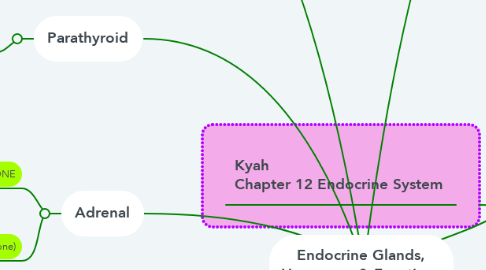
1. Promotes development of immune system cells
1.1. Hypo - depression of immune system functions
1.2. Hyper - Severe hypoglycemia (insulin shock)
2. Thyroid
2.1. T3 (Triiodothyronine)
2.2. T4 (Thyroxine)
2.2.1. Stimulate the energy metabolism of all cells
2.2.1.1. Hyper - hyperthyroidism, Graves disease
2.2.1.2. Hypo - hypothyroidism, cretinism (pre-adult); Myxedema (adult); goiter
2.3. CT (Calcitonin)
2.3.1. Inhibits the breakdown of bone
2.3.2. Causes a decrease in blood calcium concentration
2.3.3. Hyper - possible hypocalcemia
2.3.4. Hypo - possible hypercalcemia
3. Parathyroid
3.1. PTH (Parathyroid hormone)
3.1.1. Stimulates the breakdown of bone
3.1.2. Causes an increase in blood calcium concentration
3.1.3. Hyper - possible hypercalcemia
3.1.4. Hypo - possible hypocalcemia
4. Adrenal
4.1. Mineralocorticoids; ALDOSTERONE
4.1.1. Regulate electrolyte & fluid homeostasis
4.1.1.1. Hyper - increased water retention
4.1.1.2. Hypo - abnormal water loss (dehydration)
4.2. Glucocorticoids: cortisol (hydrocortisone)
4.2.1. Stimulate sexual drive in the female but have negligible effects in the male
4.2.1.1. Hyper - premature sexual (androgens) development
4.2.1.1.1. Masculinization of female
4.2.1.2. Hypo - no significant effect
5. Pancreatic Islets
5.1. Glucagon
5.1.1. Stimulates glycogenolysis in liver
5.1.2. Causes an increase in blood glucose
5.2. Insulin
5.2.1. Promotes glucose entry into all celss
5.2.2. Causes a decrease in blood glucose
5.2.3. Hypo - diabetes mellitus
6. Thymus
6.1. Thymosin
7. Atria (Heart)
7.1. ANH (Atrial natriuretic hormone)
7.1.1. Regulates fluid & electrolyte homeostasis
7.1.1.1. Hypo - fluid or electrolyte imbalances
7.1.1.2. Possible blood BP problems
8. Fat-Storing Cells
8.1. Leptin
8.1.1. Controls how hungry or full we feel
8.1.1.1. Hypo - possible obesity & other metabolic disorders
9. Kyah Chapter 12 Endocrine System
10. Pituitary
10.1. Anterior
10.1.1. TSH (Thyroid Stimulating Hormone
10.1.1.1. Hypo/Hyper under/over stimulation of thyroid
10.1.1.2. Tropic hormone Stimulates secretion of thyroid hormones
10.1.2. ACTH (Adrenocorticotropic)
10.1.2.1. Tropic hormones Stimulates secretion of adrenal cortex (produces own hormones)
10.1.2.1.1. Hyper - over stimulation of adrenal cortex hormones
10.1.3. FSH (Follicle-stimulating hormone)
10.1.3.1. Tropic hormone
10.1.3.1.1. Female
10.1.3.1.2. Male
10.1.3.1.3. Hypo lack of sexual development & sterility
10.1.3.1.4. Hypo under stimulation of adrenal cortex hormones
10.1.4. LH (Luteinizing hormone)
10.1.4.1. Tropic hormone
10.1.4.1.1. Female
10.1.4.1.2. Male
10.1.5. GH Growth Hormone
10.1.5.1. Stimulates growth in all organs
10.1.5.2. Mobilizes nutrient molecules
10.1.5.3. Causses increase in blood glucose concentration
10.1.5.4. Hyper - gigantism (pre-adult); acromegaly (mature adult) Enlargement of head, face, feet and hands
10.1.5.5. Hypo - dwarfism (pre-adult)
10.2. Posterior
10.2.1. ADH (Antidiuretic hormone)
10.2.1.1. Stimulates retention of water by the kidneys
10.2.1.2. Hyper - Diabetes Insipidus
10.2.1.3. Hypo - Abnormal water retention
11. Hypothalamus
11.1. RHs (Releasing hormones
11.1.1. Several of them
11.1.2. Stimulates the anterior pituitary to release hormones
11.1.3. Hyper - hypersecretion by anterior pituitary
11.1.4. Hypo - hyposecretion by anterior pituitary
11.2. IHs
11.2.1. There are several
11.2.2. Inhibit the anterior pituitary's secretion of hormones
11.2.3. Hyper - Hyposecretion by anterior pituitary
11.2.4. Hypo - hypersecretion by anterior pituitary
12. Medulla (Adrenal)
12.1. Epinephrine (Epi)
12.2. Norepinephrine (NE)
12.2.1. Prolong & Intensify the sympathetic nervous response during stress
12.2.1.1. Hyper - stress effects (adrenaline)
12.2.1.2. Hypo - No significant effect
13. Pineal
13.1. Melatonin
13.1.1. Inhibits tropic hormones
13.1.1.1. Affect the OVARIES
13.1.1.2. helps regulate internal clock and sleep cycles
13.1.1.3. Hyper - winter depression; sleep disorders; other possible effects
14. GI tract
14.1. Ghrelin
14.1.1. Affects energy balance (metabolism)
14.1.1.1. Hyper - increase in hunger
14.1.1.2. Suppression of fat utilization
14.1.1.3. Possible obesity
